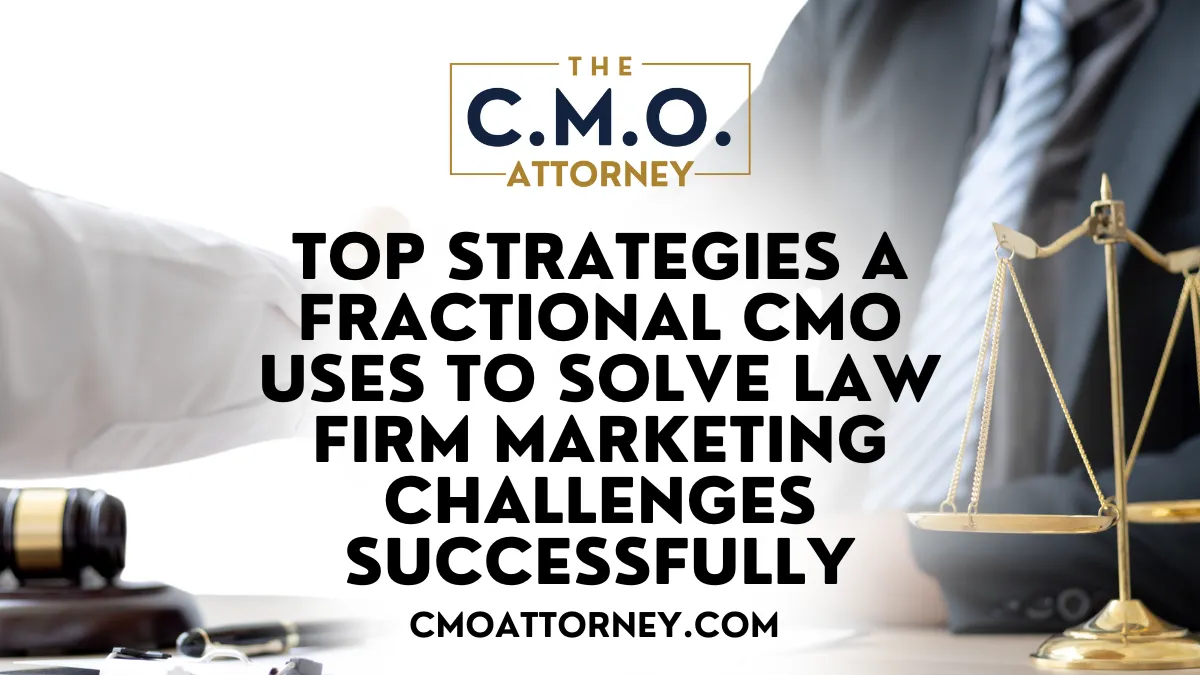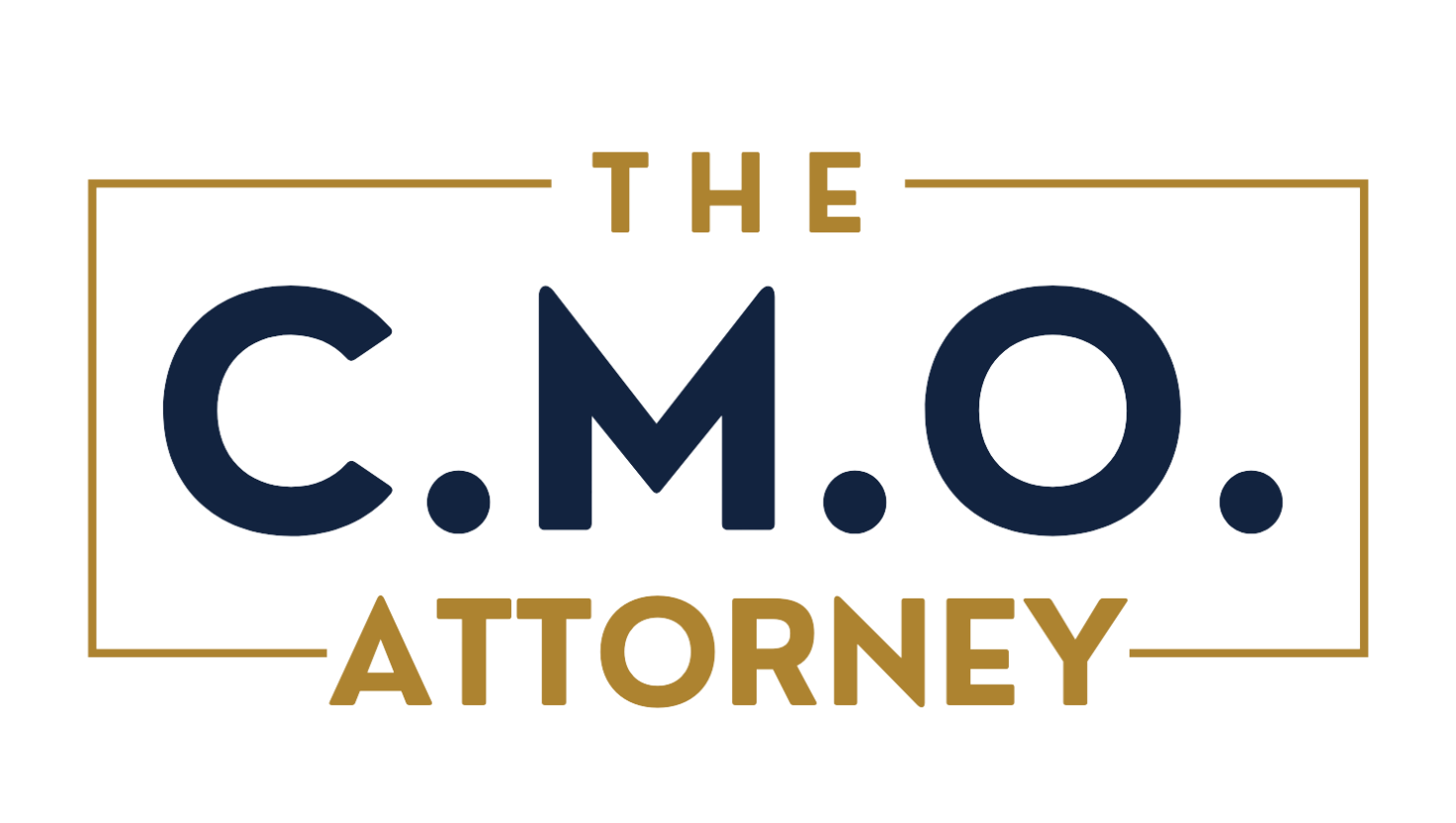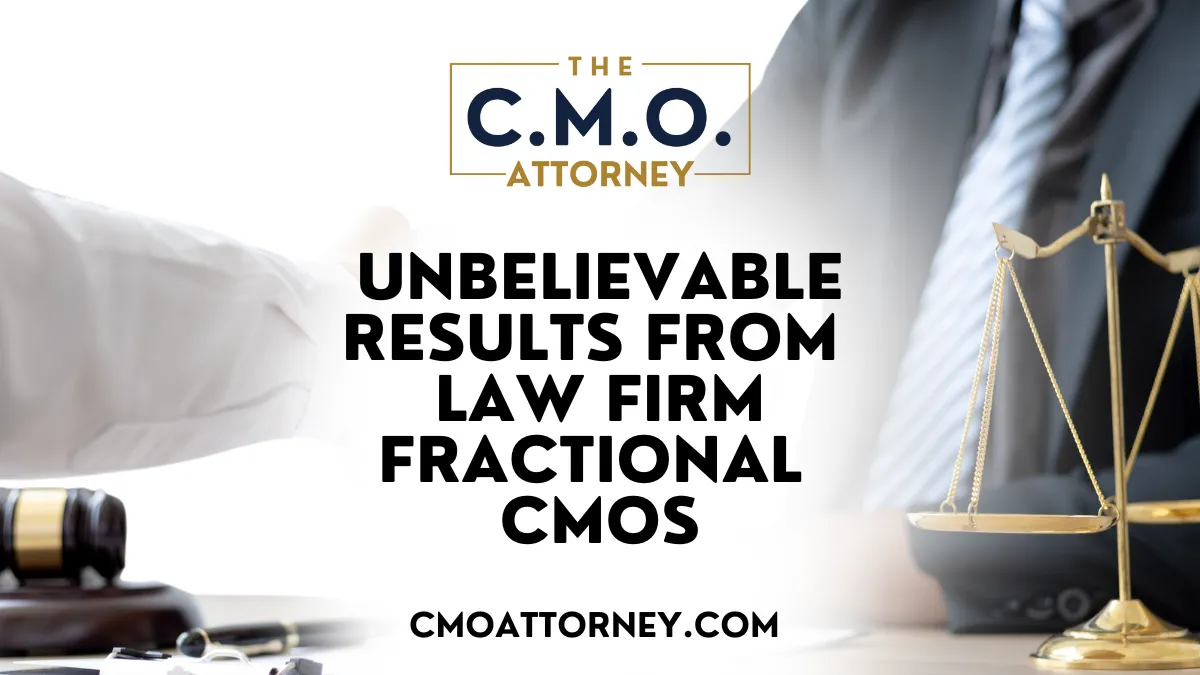 Table Of Contents:
Table Of Contents:
- Understanding the Role of a Fractional CMO in Law Firm Marketing
- Developing Tailored Marketing Strategies for Law Firms
- Implementing Effective Digital Marketing Tactics
- Optimizing Client Acquisition and Retention Strategies
- Managing Marketing Budgets Efficiently
- Continuous Assessment and Adaptation of Marketing Approaches
- Conclusion
How Can a Fractional CMO Address My Law Firm’s Unique Marketing Challenges Effectively?
Law firms often struggle with developing an effective marketing strategy that speaks to their potential clients. This blog post explores key strategies that a fractional Chief Marketing Officer (CMO) employs to address these challenges. Readers will gain insights into how to create tailored marketing plans, implement effective digital marketing tactics, and optimize client acquisition efforts. By focusing on these areas, law firms can enhance their visibility and growth. If marketing resources seem limited or your current approach isn’t delivering results, this content offers practical solutions to elevate your law firm marketing strategy. The CMO Attorney wants you to be educated on the role of fractional CMO – so let’s get started, but if you’re ready – we’re here for a free consultation of your firm’s marketing plan and growth strategy!
James Frazier | The CMO Attorney | Fractional CMO
The Role of a Fractional CMO in Law Firm Marketing
A fractional CMO brings significant value to law firms by addressing specific challenges within their marketing strategies and marketing resources. With expertise in content marketing and a keen understanding of regulatory compliance, these professionals offer consultation insights that foster a growth-oriented mindset and enhance scalability. This section will explore how a fractional CMO effectively navigates law firm marketing challenges and implements tailored law firm marketing strategy for success.
Defining the Value of a Fractional CMO for Law Firms
A fractional CMO plays a crucial role in shaping the law firm marketing strategy for law firms by providing strategic leadership and marketing resources that directly addresses the unique needs of the legal sector. Their primary focus on aligning marketing efforts with business goals ensures that law firms can effectively navigate regulatory compliance while maximizing their equity in a competitive landscape. By leveraging their expertise, fractional CMOs help law firms to develop focused campaigns that resonate with targeted audiences, leading to increased engagement and client acquisition.
Additionally, fractional CMOs bring an analytical approach to marketing by assessing current practices and identifying areas for improvement through consultation. Through data-driven insights, they guide law firms in refining their law firm marketing strategy, ensuring that marketing resources are allocated efficiently. This strategic oversight not only streamlines operations but also fosters a culture of adaptability, empowering law firms to respond to market changes proactively while maintaining a solid foundation for sustainable growth.
Distinguishing Law Firm Marketing Challenges
Law firms frequently encounter distinctive marketing challenges that stem from their culture and the regulatory landscape. The complexity of legal services often demands a nuanced understanding of how to communicate effectively with potential clients. A fractional CMO, acting as a consultant, can identify specific obstacles such as limited visibility in online advertising or the need for a more strategic law firm marketing strategy in outreach efforts, ensuring that marketing initiatives align with both the firm’s ethos and client expectations. Additionally, leveraging marketing resources can support these initiatives.
Moreover, the competitive nature of the legal field necessitates that law firms continuously adapt their marketing strategies. A fractional CMO can provide valuable consultation into overcoming challenges such as differentiation in service offerings and building a strong brand presence. By integrating effective online advertising techniques, utilizing marketing resources, and employing a data-driven methodology, these professionals empower law firms to enhance their market presence and attract a broader client base.
Developing Tailored Marketing Strategies for Law Firms
Assessing the unique market dynamics of law firms is essential for crafting effective marketing strategies. A fractional CMO leverages personal branding initiatives to position legal professionals as leaders within their practice areas. By utilizing data-driven insights and providing marketing resources, they enhance target audience engagement, ensuring that marketing assets align with current digital transformation trends in the legal landscape. Additionally, offering consultation services helps tailor the approach to each firm’s specific needs.
Assessing Unique Market Dynamics of Law Firms
Understanding the unique market dynamics of law firms is critical for developing an effective law firm marketing strategy. A fractional CMO leverages creativity and marketing resources to craft a brand narrative that resonates with potential clients and builds loyalty. By providing consultation and analyzing the target audience and their expectations, the CMO can implement tailored campaigns that address specific pain points, ultimately differentiating the firm’s services in an increasingly competitive marketplace.
Moreover, insights from retail marketing can inform these strategies, providing law firms with frameworks and marketing resources to enhance their client experience. For instance, by adopting customer relationship management tactics prevalent in retail environments, CMOs can foster deeper connections with clients. This approach not only strengthens brand loyalty but also enhances the firm’s law firm marketing strategy and visibility in the legal sector, ensuring sustained growth and relevance in an evolving market.
Crafting Personal Branding Initiatives for Legal Professionals
Crafting personal branding initiatives for legal professionals requires a strategic approach rooted in a comprehensive law firm marketing strategy, web development and thorough research. A fractional CMO focuses on creating a strong online presence that reflects each attorney’s expertise and values, ensuring that all digital platforms, including the about us page, are optimized to enhance the customer experience. By integrating user-friendly infrastructure on websites and social media profiles and providing marketing resources, law firms can effectively showcase their unique attributes, which helps in establishing a competitive advantage in a crowded marketplace.
Moreover, a successful personal branding strategy involves ongoing evaluation of market trends and client expectations. A fractional CMO utilizes insights gathered from continuous research to adjust branding efforts, ensuring they resonate with target audiences. This proactive approach not only strengthens the attorney’s public persona but also improves client engagement, ultimately driving results that align with the firm’s overall marketing objectives.
Utilizing Data-Driven Insights for Target Audience Engagement
Utilizing data-driven insights allows a fractional CMO to refine the law firm’s value proposition effectively. By analyzing client data and market trends, they can develop strategic thinking that tailors marketing efforts to address specific client needs and pain points. This focus not only enhances customer lifetime value but also aligns with the ethical standards expected in the legal profession, ensuring that all marketing initiatives reflect the firm’s commitment to integrity and client service.
Moreover, integrating data analytics into the law firm’s business model empowers fractional CMOs to make informed decisions that enhance client engagement. By strategically segmenting the target audience, they can deliver personalized content that resonates, driving improved interaction and loyalty. This strategic application of data serves to not only showcase the firm’s unique offerings but also reinforce relationships with existing clients, ultimately supporting sustainable growth in a competitive landscape.
Implementing Effective Digital Marketing Tactics
Enhancing online presence through SEO best practices is vital for law firms aiming for visibility in legal marketing. A fractional CMO focuses on leveraging social media to connect with potential clients while utilizing content marketing to nurture client relationships. These strategies ensure that comprehensive market research drives efforts, ultimately leading to improved customer satisfaction within the profession.
Enhancing Online Presence Through SEO Best Practices
Enhancing online presence through SEO best practices is a fundamental aspect of a fractional CMO‘s strategy for law firms. By optimizing website content with relevant keywords such as “lead generation,” firms can significantly improve their visibility in search engine results. For instance, incorporating insights related to “fintech” can attract a niche audience interested in legal services related to financial technology, ultimately bolstering the firm’s reputation and enhancing client engagement.
Moreover, a fractional CMO focuses on the technical aspects of SEO, ensuring that the website’s structure supports both user experience and search engine indexing. In markets like the Middle East, where digital transformation is on the rise, employing best practices for mobile optimization can lead to improved employee retention rates by streamlining internal communications. This tailored approach not only supports client acquisition but also solidifies the law firm’s position as a thought leader in their specific legal domain.
Leveraging Social Media to Connect With Potential Clients
Fractional CMOs utilize social media as a pivotal strategy for law firms seeking to establish connections with potential clients, particularly in the financial services and accounting sectors. By integrating engaging storytelling techniques into their posts, these professionals can effectively showcase the firm’s expertise while addressing common client concerns related to legal services. This approach not only builds trust but also encourages interaction, allowing the law firm to position itself as a valuable resource in addressing clients’ needs.
Moreover, a well-planned social media strategy allows law firms to minimize marketing expenses while maximizing outreach. Through targeted campaigns, fractional CMOs can refine their messaging to resonate with specific audiences, ensuring that potential clients receive relevant content that speaks to their unique circumstances. This commitment to understanding client pain points and aspirations drives meaningful engagement, ultimately enhancing the firm’s reputation in a competitive legal landscape.
Utilizing Content Marketing for Nurturing Client Relationships
Content marketing serves as a vital tool for fractional CMOs aiming to nurture client relationships within law firms. By crafting informative and engaging content that targets the firm’s audience, these professionals enhance visibility and position the firm as a trusted resource. For example, publishing blog posts on relevant legal topics not only showcases the firm’s expertise but also fosters connection with potential clients, addressing their specific legal concerns and needs.
Furthermore, a fractional CMO can streamline operational efficiency in content marketing strategies by analyzing client interactions and engagement metrics. This data allows them to adjust content delivery based on pricing considerations or popular topics that resonate with the target audience. In doing so, law firms can cultivate deeper relationships with clients, ensuring they remain top-of-mind when legal needs arise.
Optimizing Client Acquisition and Retention Strategies
Identifying key performance indicators (KPIs) is vital for law firms aiming to improve client acquisition and retention. A fractional CMO utilizes analytics to establish measurable goals that enhance overall performance. Furthermore, designing client journey mapping focuses on enriching client experiences, while building referral programs and networking opportunities leverages existing relationships to foster growth. These strategies collectively empower firms to operate efficiently and maximize overhead management.
Identifying Key Performance Indicators for Law Firms
A fractional chief marketing officer understands the importance of identifying key performance indicators (KPIs) for law firms to enhance both customer acquisition and retention strategies. By analyzing metrics such as customer acquisition cost, they help firms gauge the effectiveness of their marketing efforts. This data-driven approach not only enables firms to optimize their marketing automation tools but also aligns their strategies with the behavior and preferences of potential clients.
Moreover, implementing KPIs allows law firms to track progress toward their business goals with precision and pride. By focusing on performance metrics like client engagement rates and referral patterns, a fractional CMO can provide actionable insights that guide marketing decisions. This ongoing evaluation fosters a culture of accountability, empowering law firms to refine their approach and ensure sustainable growth in an increasingly competitive environment.
Designing Client Journey Mapping and Experience Enhancements
Designing client journey mapping is essential for law firms seeking to optimize client acquisition and retention strategies. A fractional CMO utilizes this approach to identify key touchpoints and streamline interactions, enhancing the overall client experience. By integrating digital marketing insights and aligning these touchpoints with search engine optimization tactics, law firms can ensure that potential clients find relevant content at each stage of their journey, ultimately driving revenue growth.
Moreover, experience enhancements can be achieved through influencer marketing tactics, where law firms collaborate with trusted figures in the legal field to build credibility and engagement with potential clients. By mapping the client journey and addressing any pain points along the way, fractional CMOs can create more personalized experiences that resonate with clients, leading to improved satisfaction and loyalty, which are critical for long-term success in the competitive legal landscape.
Building Referral Programs and Networking Opportunities
Building referral programs is essential for law firms aiming to enhance brand awareness and client acquisition. A fractional CMO focuses on creating systems that incentivize current clients and professional contacts to recommend the firm to others. By developing effective copywriting strategies that communicate the value of referrals, the firm can position itself as a thought leader in the legal community, driving growth while managing fractional CMO costs efficiently.
Networking opportunities complement referral programs by enabling law firms to establish relationships with potential clients and industry influencers. A fractional CMO facilitates engagement at events and conferences, ensuring that the firm is visibly positioned in relevant discussions. This proactive approach not only increases visibility but also creates a platform for building trust, thereby enhancing client retention and overall efficiency in marketing endeavors.
Managing Marketing Budgets Efficiently
Efficiently managing marketing budgets is essential for law firms aiming to maximize their impact. A fractional CMO focuses on allocating resources strategically to enhance the customer experience while highlighting the firm’s unique selling proposition. This section will cover the importance of measuring ROI on marketing investments and the benefits of outsourcing specific tasks, ensuring that resources are utilized effectively for long-term growth.
Allocating Resources for Maximum Impact
Effective allocation of resources is crucial for law firms seeking to enhance their marketing budget’s impact. A fractional CMO utilizes strategic planning to identify high-return areas where financial investments will deliver measurable results. For instance, focusing on brand equity initiatives can improve the firm’s reputation and build stronger relationships with clients, directly influencing income from new client acquisitions.
By integrating new product development approaches into marketing strategies, a fractional CMO ensures that resources are leveraged efficiently to communicate the firm’s unique value proposition. This targeted investment not only enhances operational efficiency but also maximizes the potential of available resources, allowing law firms to navigate competitive landscapes while maintaining financial sustainability.
Measuring ROI on Marketing Investments for Law Firms
Measuring ROI on marketing investments is essential for law firms aiming to maximize resource allocation and enhance their overall credibility. A fractional CMO implements advanced analytics to assess the effectiveness of various strategies, including email marketing campaigns and consumer outreach efforts. By analyzing engagement data, firms can identify which initiatives yield the highest returns, allowing for informed adjustments that increase marketing efficiency.
Furthermore, automation tools play a key role in tracking and optimizing marketing performance. By integrating these tools within their organization, law firms can streamline processes and focus on high-impact activities. A fractional CMO encourages firms to continuously monitor metrics such as customer acquisition cost and conversion rates, ensuring that marketing investments align with business goals and foster sustained growth in a competitive legal landscape.
James Frazier | The CMO Attorney | Your Future Fractional CMO
Continuous Assessment and Adaptation of Marketing Approaches
Conducting regular performance reviews is essential for law firms using fractional CMO services to effectively resolve marketing challenges. By implementing feedback loops, firms can continuously improve their marketing efforts, ensuring alignment with business goals. Staying ahead of market trends and legal regulations allows a fractional CMO, acting as chief strategy officer, to optimize the marketing funnel and leverage social media for maximum impact.
Conducting Regular Performance Reviews
Conducting regular performance reviews is essential for law firms seeking to optimize their marketing strategies. A fractional CMO utilizes their knowledge and skill to assess various marketing initiatives, evaluating the return on investment for each campaign. This practice not only identifies successful tactics but also highlights areas that require innovation, ensuring that the firm remains agile and responsive to market dynamics.
Through continuous performance evaluation, fractional CMOs foster a culture of sustainability within the firm’s marketing efforts. By implementing feedback loops and leveraging actionable insights, they can refine strategies that align closely with the firm’s business objectives. This proactive approach not only enhances the firm’s marketing performance but also solidifies its position in the competitive legal landscape, driving long-term success.
Implementing Feedback Loops to Improve Marketing Efforts
Implementing feedback loops is a critical strategy utilized by a fractional CMO to enhance marketing efforts for law firms. Conducting regular audits of marketing communications allows for the identification of areas needing improvement, particularly in web design and content creation. By integrating client feedback, law firms can create a more personalized experience that aligns with client expectations, increasing engagement and conversion rates.
With a focus on continuous improvement, fractional CMOs leverage data from client interactions to refine marketing strategies. This approach ensures that all content creation efforts resonate more effectively with the target audience. By routinely assessing marketing tactics and making necessary adjustments, law firms can stay agile and responsive to the ever-evolving landscape, ultimately driving better results from their marketing initiatives.
Staying Ahead of Market Trends and Legal Regulations
Staying ahead of market trends and legal regulations is essential for law firms aiming to achieve sustainable profit through effective law firm marketing. A fractional CMO monitors industry shifts and regulatory updates to ensure that the firm’s marketing channels remain compliant and relevant. By fostering collaboration with key stakeholders within the firm, they can quickly adapt strategies to incorporate these insights, ensuring that marketing efforts are aligned with both current practices and client expectations.
For example, by leveraging data analytics, fractional CMOs can identify emerging trends in client behavior and preferences, allowing law firms to adjust their marketing tactics. This proactive approach not only safeguards against potential compliance issues but also enhances engagement with clients. As a result, law firms can better allocate resources and maintain a competitive edge in the marketplace, ultimately driving growth and profitability in an ever-evolving landscape.
Conclusion
A fractional CMO plays a pivotal role in navigating the intricate marketing landscape of law firms, implementing tailored strategies that drive growth and compliance. By asking the right questions, leveraging data-driven insights, crafting targeted personal branding initiatives, and optimizing client engagement, they empower firms to effectively address their unique challenges. These professionals also emphasize the importance of continuous evaluation and adaptation, ensuring that marketing efforts remain relevant and impactful. Ultimately, their expertise equips law firms with the tools needed to enhance visibility, foster client relationships, and achieve sustainable success in a competitive environment.
Contact a Fractional CMO with The CMO Attorney Today!
Engaging a fractional Chief Marketing Officer (CMO) at The CMO Attorney offers law firms access to expert marketing strategies without the financial commitment of a full-time hire. This approach enhances efficiency, objectivity, and swift implementation of tailored solutions that drive growth and improve brand visibility. By aligning business goals with CMO expertise, firms can capitalize on unique industry insights and optimize their marketing efforts. Embracing these benefits empowers legal practices to navigate a competitive landscape effectively, ensuring sustained success and a strong market presence. Contact us today to schedule your free consultation!
Additional Resources:
- Boost Your Firm with Expert Legal Marketing Services
- Boost Your Firm with Legal Marketing Services
- Boost Your Firm with Expert Marketing Services
- Expert Legal Marketing Services
- Legal Marketing Services
- Enhance Your Firm’s Visibility with Professional Legal Marketing Services
- Maximize Your Law Firm’s Potential with Tailored Legal Marketing Services
- Transform Your Legal Practice with Skilled Legal Marketing Services
- Elevate Your Law Firm with Professional Legal Marketing Services
- Transform Your Firm’s Success with Comprehensive Legal Marketing Services
- Maximize Your Firm’s Growth with Professional Legal Marketing Services
- Elevate Your Firm’s Potential with Skilled Legal Marketing Services
- Enhance Your Practice with Superior Legal Marketing Services



 Table Of Contents:
Table Of Contents:
 Table Of Contents:
Table Of Contents:
 Table Of Contents:
Table Of Contents:
 Table Of Contents:
Table Of Contents: